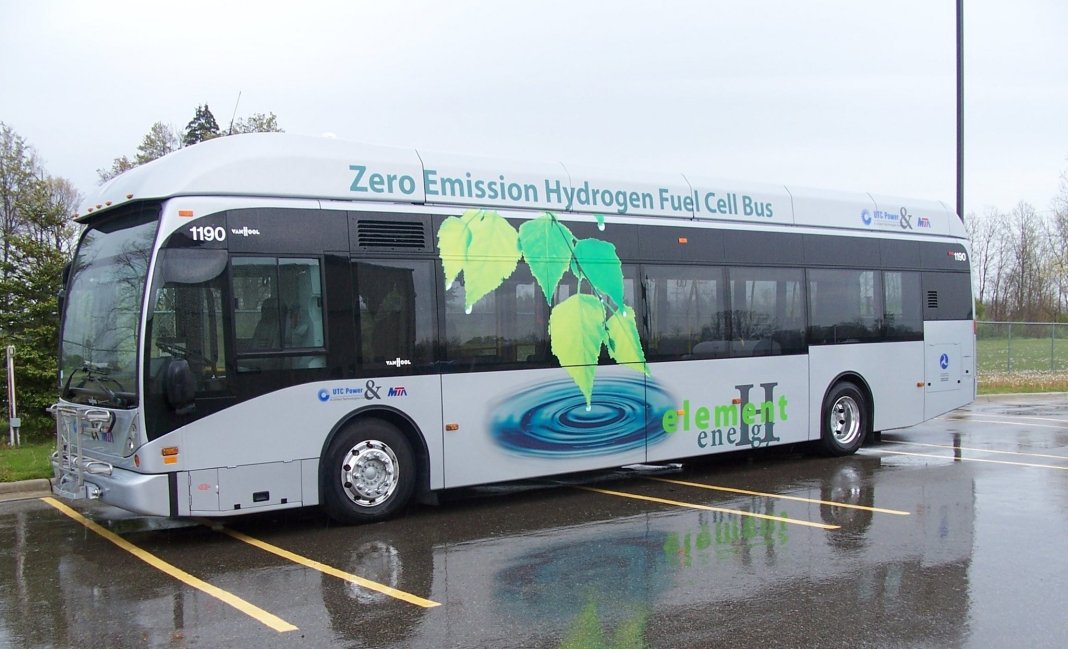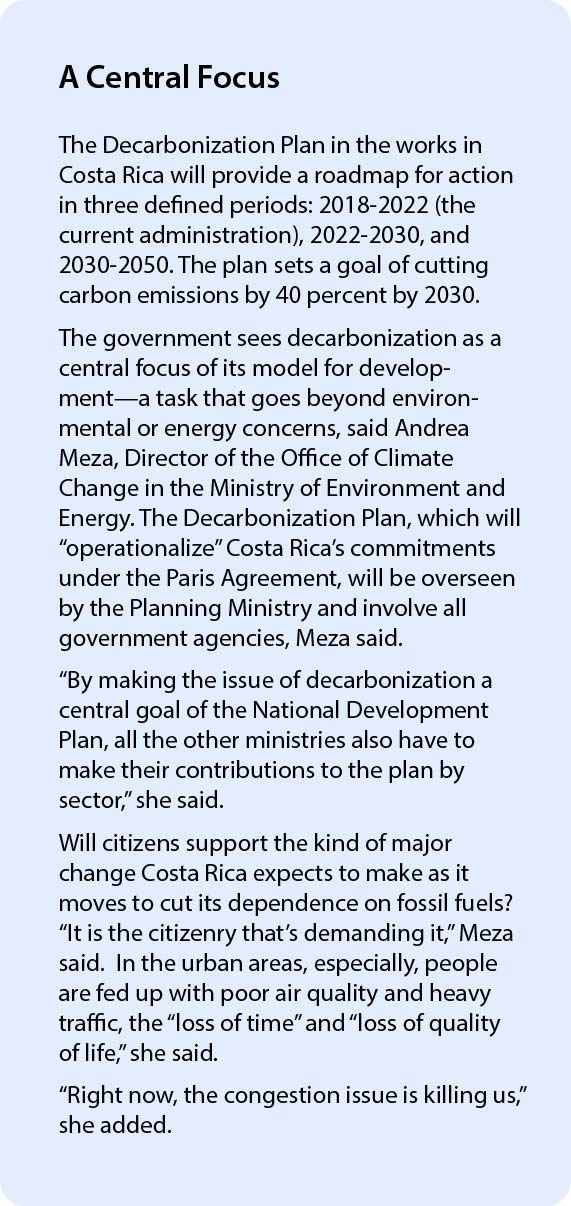

“Historically, there has been a correlation between economic growth and generation of carbon emissions into the atmosphere,” Rodríguez said in a telephone interview with the Energy and Climate Partnership of the Americas (ECPA). “The engine of economic growth is the use of fossil fuels. That is the case here and in all the countries of the world.”
Meeting the international goals and commitments on climate change will require “structural changes,” Rodríguez said. The Costa Rican government plans to take a big step in that direction by launching an ambitious Decarbonization Plan at the beginning of December.
The plan will lay out proposed policies and actions to take for the next three decades to make Costa Rica carbon-neutral. Instead of simply focusing on energy policy or environmental policy, it will make decarbonization a central, crosscutting priority under the overall National Development Plan. Transportation, agriculture, industry, land use, and solid waste are just some of the areas that will be covered under the plan.
While reducing carbon emissions is hardly a new idea in Costa Rica, Rodríguez said the issue is moving “at a different speed” under the new administration, which took office on May 8. President Alvarado, like many of the young Costa Rican voters who supported him, believes tackling the consequences of climate change must be a major priority, the Minister said.
Rodríguez, who has held several positions in Costa Rica’s Ministry of Environment and Energy before (including a previous stint as Minister, from 2002 to 2006) and has served as an executive at Conservation International, called President Alvarado “a leader who doesn’t have to be convinced.”
“He represents a new generation of Costa Ricans who want to bring about profound changes in the development model,” Rodríguez said. “He’s the one who’s providing the vision, and he’s the one who’s providing the political muscle to make this a reality.”
Costa Rica’s decarbonization efforts will build on many years of efforts by previous governments, Rodríguez pointed out. “We no longer generate emissions from deforestation, we no longer generate emissions from how we produce our electricity,” he said. “Now we have the no less complex task of decarbonizing primarily the transportation sector and at the same time addressing other smaller, but no less complicated, sectors.”
Undoubtedly, according to Minister Rodríguez, the two biggest challenges center on transportation—first, how to create a modern, efficient public transit system and second, how to design the right incentives and infrastructure so that people will drive cleaner vehicles.
On the first front, a key component is a planned electric rail system to serve the Greater Metropolitan Area, which includes the capital of San José and the cities of Alajuela, Heredia, and Cartago. Rodríguez said the government is working on securing financing for the $3 billion project and hopes to begin construction by the end of Alvarado’s four-year term. Electric buses will be another component of the public transit system.
 Because the country produces plenty of electricity, virtually all of it from renewable resources (see previous ECPA article, Going Even Greener in Costa Rica), transportation that runs on electricity makes particular sense, according to Costa Rican officials. This month, the state-owned electric utility CNFL opened the first fast-charging station in the country, one of more than two dozen planned.
Because the country produces plenty of electricity, virtually all of it from renewable resources (see previous ECPA article, Going Even Greener in Costa Rica), transportation that runs on electricity makes particular sense, according to Costa Rican officials. This month, the state-owned electric utility CNFL opened the first fast-charging station in the country, one of more than two dozen planned.
Costa Rica already has legislation in place establishing tax incentives for importing electric vehicles, but Rodríguez said other regulations still need to be enacted to encourage drivers to go electric. These include measures related to vehicle emissions standards, fuel efficiency requirements, and carbon taxes.
Rodríguez firmly believes that reforming a country’s tax structure can help drive profound economic change. Today’s economic systems tend to impose taxes on assets—whether capital, labor, profits, or property—instead of taxing “negative externalities” of development, like pollution or deforestation, he said. Imposing “green taxes,” which would make it more expensive to pollute than not to, would allow governments to lower the tax burden for good actors, according to Rodríguez. “So then we generate a tax system that allows us to move toward sustainability without losing competitiveness,” he explained.
As an example, he said, suppose a tax were imposed on containers made of single-use plastic. A manufacturer using such containers, faced with higher costs, would likely look for an alternative—perhaps a return to glass, or a switch to a biodegradable material.
Governments also need to begin to rethink the way they quantify and calculate economic indicators, Rodríguez said, so that a country’s gross domestic product reflects the value of natural resources left in place, not just those exploited.
“We need to move toward a new economic paradigm in which we think about a greener economy, a circular economy, one that is inclusive, in other words where the economic sectors that are the weakest in society can be part of the formal process of economic growth, and all the good and the bad that we do in terms of the environment, nature, and natural resources is reflected in the economic indicators.”
At a time when the country is facing fiscal constraints—in fact, thousands have taken to the streets this month as part of a labor strike over proposed tax reforms—it is especially important to have a clear accounting of costs and benefits, Rodríguez said. Determining what investments should be made in decarbonization involves tallying not just the upfront cost of a project but all its benefits, including savings in health care as cleaner air reduces respiratory diseases.
And, Rodríguez stressed, incentives to encourage the transition from an economy based on fossil fuels to one based on renewable energy must be designed correctly so that they make business sense. “The private sector plays an extremely important role because the private sector is 80 percent of a country’s economy, and they’re the ones that generate technological innovation and development,” he said.
Rodríguez believes the energy transition can be good for business—and that in Costa Rica, with its tradition of biodiversity and ecotourism, the private sector understands the benefits. “The cost of not making the transition and being subject to the impacts of climate change is much higher than not making decisions or making decisions that are trivial or tenuous,” he said.
The bicentennial of Costa Rica’s independence, coming up in 2021, will provide an apt moment for citizens to reflect on major strides the country has made in the past—such as in education, health, governance, civil rights, and sustainable development—and to set their sights on the next big challenge, Rodríguez said. “What better opportunity to foster structural changes toward a process that will take many years but that will begin here, one in which we can ensure that we have a more inclusive, more sustainable, and completely decarbonized economy.”
 View Map
View Map